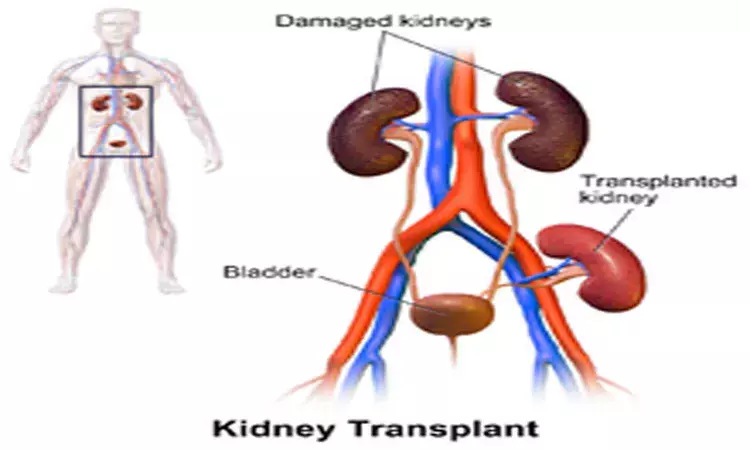- Home
- Medical news & Guidelines
- Anesthesiology
- Cardiology and CTVS
- Critical Care
- Dentistry
- Dermatology
- Diabetes and Endocrinology
- ENT
- Gastroenterology
- Medicine
- Nephrology
- Neurology
- Obstretics-Gynaecology
- Oncology
- Ophthalmology
- Orthopaedics
- Pediatrics-Neonatology
- Psychiatry
- Pulmonology
- Radiology
- Surgery
- Urology
- Laboratory Medicine
- Diet
- Nursing
- Paramedical
- Physiotherapy
- Health news
- Fact Check
- Bone Health Fact Check
- Brain Health Fact Check
- Cancer Related Fact Check
- Child Care Fact Check
- Dental and oral health fact check
- Diabetes and metabolic health fact check
- Diet and Nutrition Fact Check
- Eye and ENT Care Fact Check
- Fitness fact check
- Gut health fact check
- Heart health fact check
- Kidney health fact check
- Medical education fact check
- Men's health fact check
- Respiratory fact check
- Skin and hair care fact check
- Vaccine and Immunization fact check
- Women's health fact check
- AYUSH
- State News
- Andaman and Nicobar Islands
- Andhra Pradesh
- Arunachal Pradesh
- Assam
- Bihar
- Chandigarh
- Chattisgarh
- Dadra and Nagar Haveli
- Daman and Diu
- Delhi
- Goa
- Gujarat
- Haryana
- Himachal Pradesh
- Jammu & Kashmir
- Jharkhand
- Karnataka
- Kerala
- Ladakh
- Lakshadweep
- Madhya Pradesh
- Maharashtra
- Manipur
- Meghalaya
- Mizoram
- Nagaland
- Odisha
- Puducherry
- Punjab
- Rajasthan
- Sikkim
- Tamil Nadu
- Telangana
- Tripura
- Uttar Pradesh
- Uttrakhand
- West Bengal
- Medical Education
- Industry
Renal Transplantation linked to improvement of anemia in CKD patients,finds study

Anemia is virtually universal at the time of kidney transplantation because chronic kidney disease (CKD) blunts erythropoietin production.Renal transplantation presents multiple complications after its completion, some of them related to the behavior of hemoglobin levels. Researchers conducted a study to determine the behavior and prevalence of anemia and erythrocytosis in the first year after renal transplantation.
They found that mean hemoglobin levels in patients prior to kidney transplantation are usually low in CKD patients but transplantation allows hemoglobin levels to recover. The findings have been published in the Journal Transplantation Proceedings.
In a retrospective, observational study was conducted of a cohort of patients of the 21st Century National Medical Center in Mexico of transplants performed from January 1, 2013 to December 31, 2017. A total of 649 met the inclusion criteria. Pre-transplant hemoglobin (Hb) levels were determined, as well as levels 1 month, 3, 6, 9, and 12 months after transplantation, and the prevalence of anemia and erythrocytosis was determined in each month. Descriptive analysis was performed with measures of central tendency and measures of dispersion. The statistical program SPSS version 25 was used.
In the study of kidney transplant recipients, 73% had had pre-transplant anemia, defined as hemoglobin levels below 12 g/dL, the researchers reported.The mean pre-transplant hemoglobin levels for the study population as a whole was 10.69 g/dL.
It was found found that at 1 year after transplantation, the cohort had a mean hemoglobin level of 14.45 g/dL, or a mean increase 3.76 g/dL compared with pre-transplant levels.
The proportion of patients with anemia and erythrocytosis at 1 year was 12.9% and 5.9%, respectively.
The researchers concluded that renal transplantation allows Hb levels to recover in a multifactorial way; however, the persistence of anemia and erythrocytes creates a study challenge in any transplant unit, due to their prevalence of 12.9 and 5.9% respectively
"Much more information is needed on why patients continue in anemia despite transplantation, and, even more so, why patients reach erythrocytosis 1 year after the transplant," the authors wrote.
For further reference log on to:
Morales KBR, Pérez RE, López JDC, et al. Anemia and erythrocytes: Behavior and prevalence 1 year after kidney transplant. Transplant Proc. 2020 https://doi.org/10.1016/j.transproceed.2020.01.053
Dr Kartikeya Kohli is an Internal Medicine Consultant at Sitaram Bhartia Hospital in Delhi with super speciality training in Nephrology. He has worked with various eminent hospitals like Indraprastha Apollo Hospital, Sir Gangaram Hospital. He holds an MBBS from Kasturba Medical College Manipal, DNB Internal Medicine, Post Graduate Diploma in Clinical Research and Business Development, Fellow DNB Nephrology, MRCP and ECFMG Certification. He has been closely associated with India Medical Association South Delhi Branch and Delhi Medical Association and has been organising continuing medical education programs on their behalf from time to time. Further he has been contributing medical articles for their newsletters as well. He is also associated with electronic media and TV for conduction and presentation of health programs. He has been associated with Medical Dialogues for last 3 years and contributing articles on regular basis.
Dr Kamal Kant Kohli-MBBS, DTCD- a chest specialist with more than 30 years of practice and a flair for writing clinical articles, Dr Kamal Kant Kohli joined Medical Dialogues as a Chief Editor of Medical News. Besides writing articles, as an editor, he proofreads and verifies all the medical content published on Medical Dialogues including those coming from journals, studies,medical conferences,guidelines etc. Email: drkohli@medicaldialogues.in. Contact no. 011-43720751


